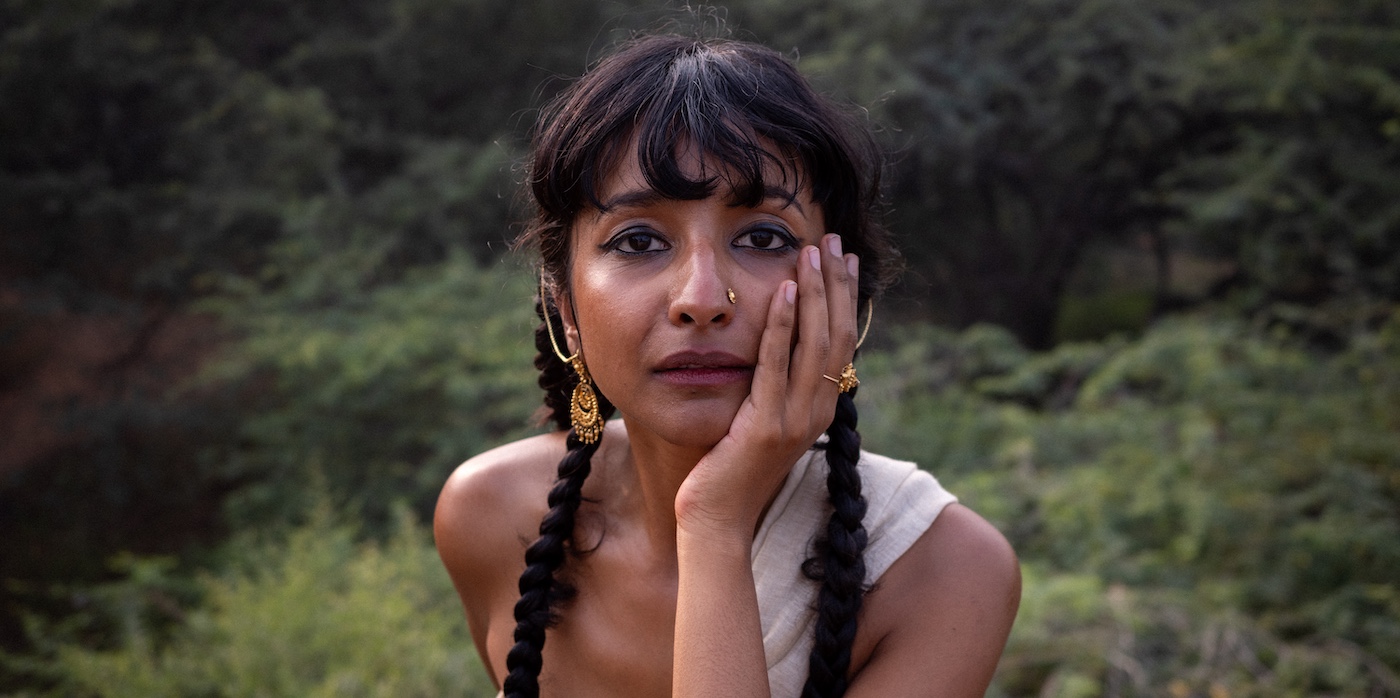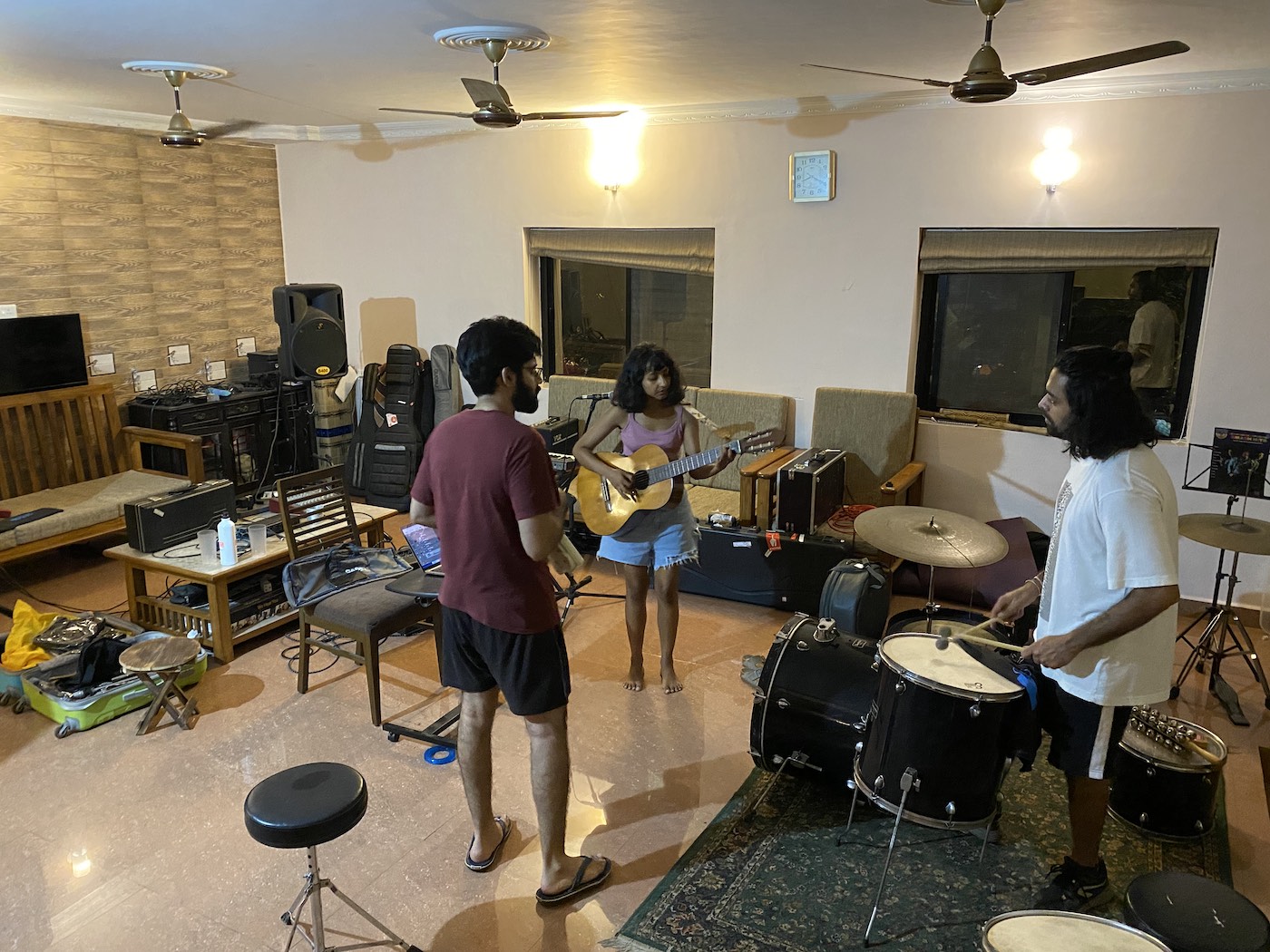Review: 'Kali' Sees Ditty Blending Protest With Intimate Truths

8 April 2025
Evidently, it’s tricky to carry the torch from protest-driven beat poetry-inspired folk singer-songwriters like Joan Baez and Bob Dylan without sounding like a tribute to the said acts and their times – evident from the ever-refreshing list of acts that fall in that trap. Aditi Veena aka Ditty has been a successful outlier in that effort for the Indian subcontinent since at least her 2019 debut album ‘Poetry Ceylon’ (if not the decade-old EP ‘Mumblings’).
Compelling listeners closer till gatherings of different sizes and settings unfailingly turn into quiet circles of protest and introspection over plucked guitar rhythms, Ditty’s songs have spoken against the powers that be over the years – more often tackling environmentalism themes thanks to her background as an urban ecologist. While there is no dearth of other artists attempting the same, in Ditty’s music, the politics doesn’t usually feel like a decision or an arduous undertaking, but a natural intuition that sprouts from a personal space.
“I think my personal life situations often become a starting point for me to then investigate the larger issues of the world,” confirms the Goa-rooted singer-songwriter citing the single ‘Money’ from her latest album ‘KALI’ as an example. A rousing upbeat number uplifted by pounding drums and handclaps with a light-hearted critique of capitalist mindset, the song was inspired by Ditty returning to her quaint village in North Goa after a tour to find the forest behind her house chopped down.
Environmental themes continue to figure prominently in Ditty’s albums. Alongside ‘Money’, ‘Hey Mamma’ too is an oath to Mother Earth, declaring the intention to protect and join in her strength. What differentiates then ‘KALI’ from its predecessor ‘Poetry Ceylon’ is Ditty’s growth into more modern melodies, stepping out (though not completely) from the influence of spoken word, and more overtly, a foray into writing in Hindi.
The language change allows a fresher feel to older themes with a track like ‘AZADI’ singing about letting forests and natural landscapes remain intact. Poetic Hindi lyricism like “Parvaton ki khamoshi ko samjho na tum buzdili // Kaatta hai pani bhi chattano ko” (“Don’t mistake the mountain’s silence for cowardness // Even water can cut through hard rock”) to a dramatic and haunting melody before it turns serene on the refrain of “Azadi”.
“Just being away from the motherland and also the subcontinent has incited this wish for me to start writing in Hindi”, says Ditty who has battled critical health obstacles, gotten married and moved to Berlin in the last half decade and is currently embarking on taking her music across Europe.
Though none of these milestones finds a discernible mention on the album, which also includes all the songs from her last year’s EP ‘Skin’, the 10-track release does show Ditty being more open about her personal life. For me, it’s that feature and not the language that differentiates ‘KALI’ from its predecessor.
The very opening lines of the album, “Kaash meri dadi yeh kehti, ‘Khoobsoorat hai tu meri jaan’” (“I wish my grandmother had said, ‘you are beautiful, my love’”) on the title track is a painful, impressively bold, and, for many, all too relatable a confession for anyone put down for their darker skin. It bares the hurt from childhood and looks at it unflinchingly before, fittingly to that brazenness, breaking into the affirmation “Hoon main Kali” (“I am Kali”) – the word ‘Kali’ working to signify both: a girl with dark skin and the Hindu Goddess. The song works autobiographically while also tackling the theme of colourism.

Behind the scenes for Ditty's 'KALI'
‘Money’ and ‘Hey Mamma’ too manage to work on multiple levels. The former reminisces on childhood naivety and growth from feeling “sorry for myself” into the joy and optimism of love while addressing capitalism. The latter oath for environmentalism functions as a reinforcement of personal strength, joining the closers ‘Wonder’ and ‘Home In My Skin’ as empowering affirmations for the self on the album while also addressing a self-critical, hard-on-self past for the singer-songwriter.
The approachable emotionality of personal situations makes the songs more relatable and consequently, when it is present in lesser amounts like on ‘DUNYA’ is when the album is at its weakest. Though the song itself addresses how certain sentiments and themes that should remain gut-wrenching have become so ever-present and normalised that they no longer evoke the emotional response they should, its very repeated cry of ‘No we don’t want this for our children’ feels overtly simplistic, more fitting school children hymns than offering the depth and emotional credence that makes the politics of the rest of the album feel more poignant, sincere and authentic.
On the other extreme of dealing with personal narratives and emotional efficiency, Ditty’s lilting melodies find an easy match with romantic reflections on ‘Hold Me’, ‘So Real’ and ‘Surreal’. Painting pictures while reminiscing on encounters and situations, the songs come replete with details with the latter two connecting with their concluding lines to become companion pieces and proving bigger than their sum in painting a picture of a love from start to end.
“The song is about a short romance I had with someone but I always question if this person would love me if I was not a singer and writing music,” Ditty explains before reiterating her tendency to find personal experiences as catalysts that lead her down to reflection and commentary and themes larger than herself. “‘So Real’ is definitely a personal song. That comes from a very personal space but even through that song, I am questioning what makes someone love someone or fall for someone.”
 Behind the scenes for Ditty's 'KALI'
Behind the scenes for Ditty's 'KALI'
That’s the enduring power of ‘KALI’ – and Ditty’s work at large. It makes you grapple with themes like what drives love, money, colourism, and nature, but never from a pulpit. Instead, it invites you into a living room or a childhood memory. There’s a disarming gentleness to the way the music unspools difficult questions, often beginning from a memory, a fleeting feeling, or a conversation with the self. It’s a quiet trick that makes Ditty’s protest different. It doesn’t raise its voice to make a point so much as ask you to sit with her and makes sure you’re paying attention.
Words: Amaan Khan

 Behind the scenes for Ditty's 'KALI'
Behind the scenes for Ditty's 'KALI'